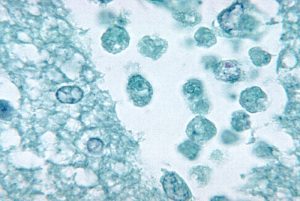By NewsDesk @infectiousdiseasenews
Health officials in Karachi, Pakistan reported 16 Naegleria fowleri infections/deaths (primary amoebic meningoencephalitis [PAM]) in 2019. In fact, more cases of N. fowleri were reported in Karachi since the first case was reported in 2008, which stands at 146, than in the United States (145 cases were reported from 1962-2018).

Image/CDC
In a correspondence published in the recent The Lancet Journal of Infectious Diseases , researchers from the National University of Medical Sciences in Rawalpindi, Punjab, Pakistan suggest of the possibility of a genetically unique strain of the parasite in Pakistan.
They state in the letter:
Of all the reported cases of PAM in Pakistan, all were in Muslims and only two individuals had a history of recreational water activity. Therefore, it can be inferred that N. fowleri exists in the domestic water supply of Karachi and that infection largely results from ablution, which is unexpected because water is normally saline in Karachi city, and amoebas are unable to survive in saline water. This finding suggests that the N. fowleri strain present in Pakistan has developed resistance to saline environments or that it is different from strains reported in the rest of the world.
Costa Rica reports Naegleria fowleri case, 2nd case in history
The authors conclude that an investigation of the whole genome of the amoeba would elucidate the genome sequence of this newly emerging resistant strain in Pakistan that will be helpful in diagnosis and early disease prevention.
Bangladesh: Record dengue year ends with 164 deaths
Pakistan reports most polio cases in years in 2019

